初中语法专题7介词专题
初中语法大全讲解--介词
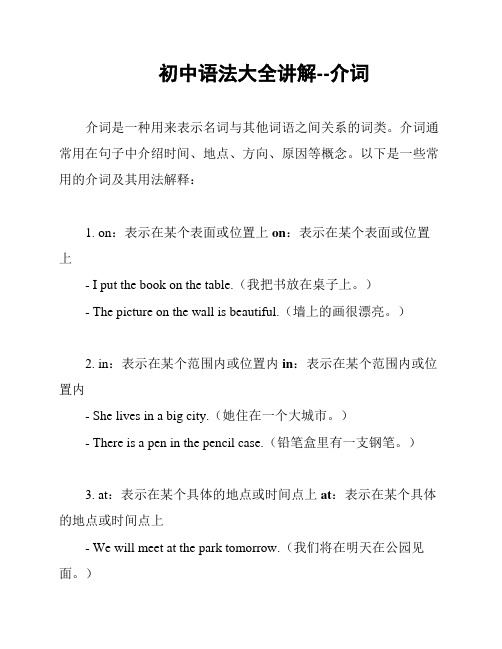
初中语法大全讲解--介词介词是一种用来表示名词与其他词语之间关系的词类。
介词通常用在句子中介绍时间、地点、方向、原因等概念。
以下是一些常用的介词及其用法解释:1. on:表示在某个表面或位置上on:表示在某个表面或位置上- I put the book on the table.(我把书放在桌子上。
)- The picture on the wall is beautiful.(墙上的画很漂亮。
)2. in:表示在某个范围内或位置内in:表示在某个范围内或位置内- She lives in a big city.(她住在一个大城市。
)- There is a pen in the pencil case.(铅笔盒里有一支钢笔。
)3. at:表示在某个具体的地点或时间点上at:表示在某个具体的地点或时间点上- We will meet at the park tomorrow.(我们将在明天在公园见面。
)- He is waiting for you at the front door.(他在门口等你。
)4. to:表示朝向某个目标或对象to:表示朝向某个目标或对象- She walked to school.(她走向学校。
)- Can you pass the book to me?(你能把书递给我吗?)5. with:表示伴随或使用某个工具或对象with:表示伴随或使用某个工具或对象- I went to the park with my friends.(我和我的朋友一起去了公园。
)- He wrote the letter with a pen.(他用钢笔写了这封信。
)6. by:表示通过某种方式或交通工具by:表示通过某种方式或交通工具- We usually go to school by bus.(我们通常坐公交车去学校。
)- She sent the gift by mail.(她通过邮寄发送了礼物。
初中英语语法专题—介词讲解
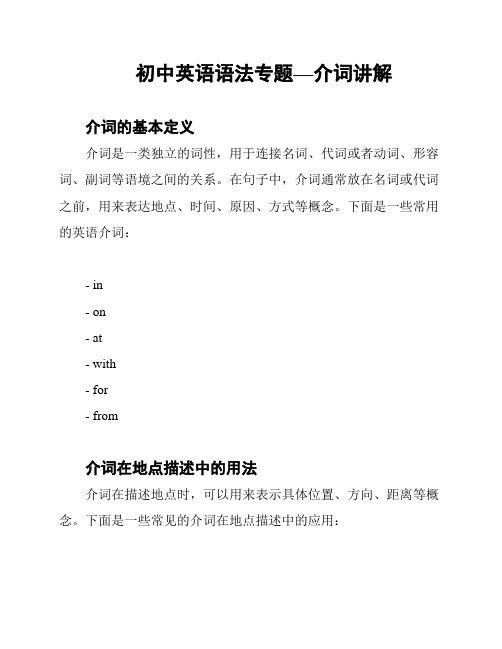
初中英语语法专题—介词讲解介词的基本定义介词是一类独立的词性,用于连接名词、代词或者动词、形容词、副词等语境之间的关系。
在句子中,介词通常放在名词或代词之前,用来表达地点、时间、原因、方式等概念。
下面是一些常用的英语介词:- in- on- at- with- for- from介词在地点描述中的用法介词在描述地点时,可以用来表示具体位置、方向、距离等概念。
下面是一些常见的介词在地点描述中的应用:- in:用于表示在某个范围之内的位置,例如 "in the room"(在房间里),"in the park"(在公园里)。
- on:用于表示在表面、平台或者位置上的状态,例如 "on the table"(在桌子上),"on the bus"(在公交车上)。
- at:用于表示在某个具体位置或者地点,例如 "at the cinema"(在电影院),"at school"(在学校)。
- to:用于表示朝向某个位置的移动,例如 "go to the park"(去公园)。
介词在时间描述中的用法介词在描述时间时,可以用来表示具体时间、时间段等概念。
下面是一些常见的介词在时间描述中的应用:- at:用于表示具体的时间点,例如 "at 7 o'clock"(在7点钟)。
- on:用于表示具体的日期或者星期几,例如 "on Monday"(星期一),"on January 1st"(1月1日)。
- in:用于表示较长的时间段或者某一个时间段内,例如 "inthe morning"(早上),"in July"(在七月)。
介词在原因描述中的用法介词在描述原因时,可以用来表示某事的起因或者原因。
江苏省苏州市中考英语语法专题练习7《介词》

《介词》1.掌握常见介词的基本用法;2.学会运用由介词构成的短语;3.区分运用易混淆介词。
时间介词( )1. We all like watching the TV program Readers Saturday evening.A in B. on C. at D. for( )2. Over 10,000 runners joined a half and a mini marathons in Xianlin, Nanjing May 7, 2017.A. inB. onC. atD. by( )3. It is reported that heads of the state 29 foreign countries attended the Belt and Road Forum for International一带一路国际合作高峰论坛) May 14 and 15,2017.A in; at B. at; forC. from; onD. of; in( )4. 一When is the Art Festival party?一It's seven o'clock the evening of November 18th.A. at; inB. at; onC. on; inD. in; on( )5. 一I haven't finished the book report of Journey to the West. It's so difficult.一You should hurry up. The report is due three days.A. inB. forC. onD. at( )6. 2000, this company has seen much new development. It has become one of the biggest companies in the country.A. ForB. InC. ByD. Since( )7. Father brought his little boy to a concert. But he was too young to sit the whole concert.A. forB. withC. duringD. through( )8. 一Did you get WeChat red packets(微信红包) the Spring Festival?一Yes. It's actually the most popular way of sending traditional holiday presents now.A. withB. forC. duringD. after方式介词( )1. My son lives a little far from his office, so he always goes to work bus.A. onB. byC. withD. in( )2. How does Jane with her mother? making phone calls or chatting onlineA. keep in touch; WithB. keeping touch; ByC. keep in touch; ByD. keeping touch; With方位介词( )1. A bird flew into the kitchen the window.A. acrossB. aboveC. throughD. under( )2. Nora opened the box. To her surprise, it was a gold watch.A. outsideB. insideC. besideD. behind( )3. 一Why are you unhappy these days, Julie?一I can't see the blackboard because two tall boys sit me.A. behindB. next toC. in front ofD. between( )4. 一Taiwan is an important part of China.一Yes it lies the southeast of China.A in B. on C. to( )5. A woman stood the window, watching the children playing games inthe garden.A. pastB. throughC. acrossD. by( )6. I can't see Lucy because she is the tree.A. in front ofB. behindC. next to其他常见介词( )1. There's one taken by the River Seine these photos. Can you find itout?A. exceptB. includingC. betweenD. among( )2. 一I'm thirsty. I'd like a glass of orange juice. What about you, Dad?一I prefer a cup of coffee nothing in it.A. withB. withoutC. forD. to( )3. 一If someone is your way, what will you do?一I will wait until he or she moves instead of pushing past.A. inB. onC. byD. along( )4. Your gloves should be made leather, for they feel soft and smooth.A. inB. onC. forD. of( )5. Music has become a bridge the East and the West.A. inB. atC. amongD. between( )6. I met Mary, and she lent me ¥20. It was kind her to lend me the money.A. forB. ofC. withD. in( )7. The population of our city has increased 40% compared with of 3 years ago.A. by; thatB. to; thoseC. with; onesD. of; it( )8. Since you are danger, why not ask help?A. in; forB. in; toC. with; forD. with; to( )9. I bought some flowers my mom my best wishes on her birthday.A for; with B. to; forC. of; toD. from; with( )10.一Your best friend is really talented learning foreign languages.一Yes, he is also good other subjects.A in; with B. at; forC. in; atD. at; to( )11. 一Do you have anything else to say for being late again?一No, nothing sorry.A. aboveB. behindC. fromD. but( )12. 一Reading is a good way to spend the time on the plane.一That's true. I never go travelling a bookA. withoutB. fromC. onD. about( )13. 一What do you often do classes to relax yourselves?一We often do some running or listen to music.A. inB. throughC. betweenD. among( )14. 一Can you come to my party this evening?一Sorry, I can't. I have to prepare my exams.A. ofB. forC. aboutD. with( )15. 一Thanks our government, we can play sports on the new playground next week.一That's for sure! And we'll have sports meeting one month.A. for; inB. to; inC. for; afterD. to; after介词短语( )1. Grace often gets nervous before she gives a speech .A. in publicB. in totalC. in common( )2. MissLi, , is active all the time. Although she has not been well these days, her class is still full of laughter.A. As you knowB. start withC. all in all( )3. 一Most of the wild animals are because of their bad living environment.一So we must do something to save them.A. in needB. on dutyC. at workD. in danger( )4. When you're invited to have dinner at home by an American friend, you should be or a little later. It's different from our Chinese custom.A. on timeB. on businessC. on show( )5. 一 , there must be life on other planets though none has been discovered.一I agree with you. The universe is so large after all.A. To my surpriseB. To be honestC. In my opinionD. Again and again( )6. the scientists' hard work, Tiangong II was launched(发射)successfully.A. As forB. Thanks toC. Instead ofD. According to参考答案时间介词1-8 BBCBADDC方式介词1-2 BC方位介词1-6 CBCADB其他常见介词1-10 DAADDBAAAC 11-15 DACBB介词短语1-6 AADACB。
初中英语介词专项
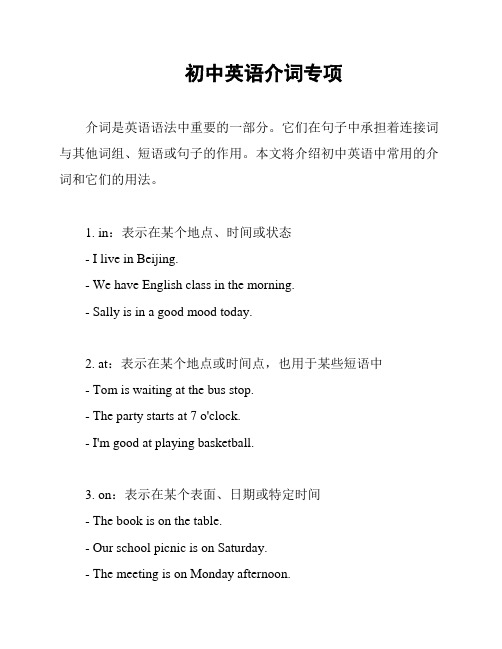
初中英语介词专项介词是英语语法中重要的一部分。
它们在句子中承担着连接词与其他词组、短语或句子的作用。
本文将介绍初中英语中常用的介词和它们的用法。
1. in:表示在某个地点、时间或状态- I live in Beijing.- We have English class in the morning.- Sally is in a good mood today.2. at:表示在某个地点或时间点,也用于某些短语中- Tom is waiting at the bus stop.- The party starts at 7 o'clock.- I'm good at playing basketball.3. on:表示在某个表面、日期或特定时间- The book is on the table.- Our school picnic is on Saturday.- The meeting is on Monday afternoon.4. by:表示通过某种方式或通过某种交通工具- We went to school by bus.- He sent the message by email.- She solves math problems by using a calculator.5. with:表示与某人一起或用某物- I went to the movie with my friends.- Can you write with a pen?- Sarah cooked dinner with fresh ingredients.6. from:表示起点或来源- The train departs from Shanghai.- This gift is from my parents.- I learned English from my teacher.7. to:表示方向、目的地或目标- Lisa walked to the park.- We are going to the supermarket.8. for:表示目的、利益或时间段- I bought this book for studying English.- He exercises for his health.- The party lasted for four hours.以上是初中英语中常见的介词及其用法。
【初中英语】初中英语关于介词的语法大全

【初中英语】初中英语关于介词的语法大全
【—关于介词的】下文是老师为同学们带来的关于介词的介绍,及介词是什么?供同学们参考。
介词
为什么先说介词
因为在英语测试中,介词的用法较为普遍
它是一种用来表示词与词, 词与句之间的关系的词
在句中不能单独作句字成分
介词后面一般有名词代词或相当于名词的其他词类,短语或从句作它的宾语
介词和它的宾语构成介词词组,在句中作主语, 状语,表语,补语或介词宾语
比如说:
Most of the students went to the classroom. 大部分学生去了教室。
We play basketball on the sports ground. 我们在操场上打蓝球。
介词常与动词,形容词,名词一起构成固定搭配
比如说:
belong to 属于;rely on 依靠;talk to 同...谈话;be afraid of 害怕;be strict with对...严格
介词一般放在名词之前
但它后面的介词宾语是疑问代词、疑问副词或者关系代词时
这些词就提到了前面
剩下介词在后了
比如说:
Where do you come from? 你是哪儿人?
Who are you talking to? 你在跟谁谈话呢?
What do you study for? 你为了什么而学习?
这些词看似不难,却使许多同学苦不堪言
其实介词的使用有规可循,同学们只要记住了规律,万变不离其宗
希望同学们要好好的掌握介词的用法,如果还有不懂的可以参考例句进行学习哦!
感谢您的阅读,祝您生活愉快。
初中英语语法介词

初中英语语法介词介词在英文中是一种虚词,在英语里面的使用频率特殊高。
下面是学习啦我为你整理的初中英语的介词语法,希望大家宠爱!常用介词的用法1. 在的前面in front of (范围外的前面)in the front of (在范围内的前面)There is a river ________ my house.我家前面有一条河。
There is a blackboard ___ our classroom .教室前面有一块黑板。
2.在树上on the tree 强调树上长出的东西(苹果,橘子)in the tree 外来物体(人,鸟,风筝)There are some birds _____ the tree.树上有一些鸟。
There are some apples _______ the tree.树上有一些苹果。
3.时间表达:in + 某月/ 某季节/ 某年(时间长)on + 某天(中)at + 具体几点几分(短) 固定短语:in the morning / afternoon / evening at night, at noon练习:__January , __ summer, ___ 2021______ Sunday, ___ March 4th, ___ March___ _ Sunday morning,_____ the morning_______ the morning of June 5th_______ 6:30, ____ night, __ noon4.在墙上on the wall在墙壁外表(相片photo,图画picture)in the wall在墙壁的里面(门door, 窗户window )(1)There is a photo of my family_______ the wall.(2)There are two doors ______ the wall.5. 在之上on:在的外表之上(物体之间有接触)over: 在的正上方(物体没有接触)above 高于......;在......之上',多指在相对较高位置(1)There is a book ______ the desk.书桌上有一本书。
课件3:专题7 介词和介词短语

8. into 将纸条“放入”口袋里。 9. at 因look at表示“看”。 10. of 因of use =useful。 11. at 因knock at the door表示“敲门”。 12. at 因at the door表示“在门口”。 13. at 因at once表示“立即,马上”。 14. for 因look for表示“寻找”。 15. in 因表示“惊奇地”用in surprise。
语法专题
专题7 介词和介词短语
介词与高考 介词后一定要接宾语,作宾语的通常是名词、代词或动名 词或what从句。 1.做语法填空时,若空格后是名词、代词或动名词或what 从句,且他们在句中不是作主语、表语或动词的宾语时,这 个空格就很可能是填介词。然后根据句子意思和空格前后词 语的搭配习惯来确定填哪一个介词。 2.在短文改错中,主要考查介词的多用、误用、漏用以及 介词后接动词原形而不是动名词。
6. Jane stopped where a small crowd of men had gathered. She found some good quality pipes _o_n__sale.
固定搭配on saleБайду номын сангаас 表示“出售”。
7. When Jane got home, with her small but well-chosen present in her bag, her parents were already __a_t table having supper.
专题07 介词与连词_备战2021年小升初英语必考语法和题型(解析版)
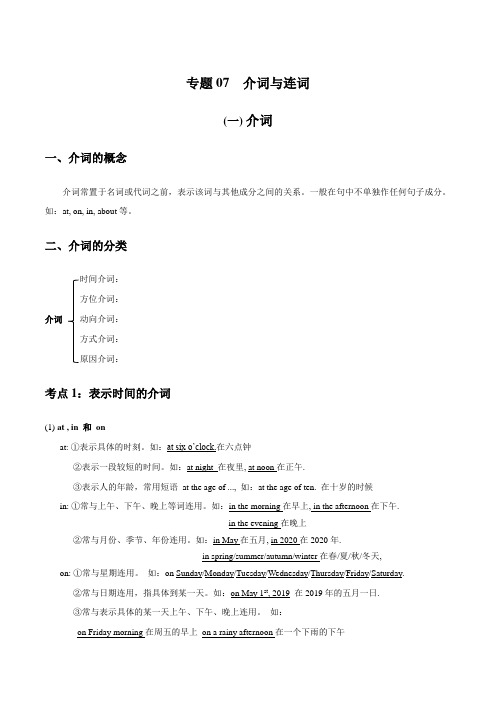
专题07 介词与连词(一)介词一、介词的概念介词常置于名词或代词之前,表示该词与其他成分之间的关系。
一般在句中不单独作任何句子成分。
如:at, on, in, about等。
二、介词的分类时间介词:方位介词:介词动向介词:方式介词:原因介词:考点1:表示时间的介词(1) at , in 和onat: ①表示具体的时刻。
如:at six o’clock.在六点钟②表示一段较短的时间。
如:at night 在夜里, at noon在正午.③表示人的年龄,常用短语at the age of ..., 如:at the age of ten. 在十岁的时候in: ①常与上午、下午、晚上等词连用。
如:in the morning在早上, in the afternoon在下午.in the evening在晚上②常与月份、季节、年份连用。
如:in May在五月, in 2020在2020年.in spring/summer/autumn/winter在春/夏/秋/冬天, on: ①常与星期连用。
如:on Sunday/Monday/Tuesday/Wednesday/Thursday/Friday/Saturday.②常与日期连用,指具体到某一天。
如:on May 1st, 2019 在2019年的五月一日.③常与表示具体的某一天上午、下午、晚上连用。
如:on Friday morning在周五的早上on a rainy afternoon在一个下雨的下午on the evening of May 5th在五月五日的晚上(2) before 和after 用来表示时间的先后顺序before:在……之前after:在……之后如:Spring comes before summer. 夏天之前是春天。
Come to my office after class. 放学后来我的办公室。
(3) from 用来表示从某段时间开始的动作,常与to 连用构成短语“from…to…”译为“从……到……”。
第七章介词(思维导图+知识梳理+好题精炼)2022-2023初中英语中考语法归纳

第七章介词思维导图知识梳理一、介词的定义介词又叫前置词,一般放在名词的前面.介词是一种虚词,一般不重读,不能在句子中独立充当一个成分,它只是表示它后面的名词、代词或相当于名词的词、短语或从句与其他句子成分的关系.二、介词的分类按照词的构成,英语的介词可分为简单介词、合成介词、双重介词、短语介词等.(一)简单介词即由一个词构成的介词.如about, above, across, after, against, among, at, before, behind, below, beside, besides, between, beyond, by, down, during, except, for, from, in, of, off, on, over, past, round, till, to, with等.(二)合成介词即由两个简单介词组合而成的介词.如inside, into, onto, out of, outside, upon, throughout, within, without 等.(三)双重介词双重介词指两个介词连着使用,使表达的意思更确切、更明了.如:up to, from behind, from inside, from among, at about等.(四)短语介词由一个或两个简单介词和一个或几个其他词类组合成一个短语,作用相当于一个介词,这类短语介词的末尾总是一个简单介词.如:as far as, as early as等.三、介词的用法介词不能单独作为句子成分.它必须用在名词或代词之前组成介词短语,修饰动词、名词或代词,表示时间、地点、空间和其他关系.介词后面的名词、代词或其他成分作介词的宾语.介词与它后面的宾语一起构成介词短语才能在句子中充当某一成分.介词短语在句中主要用作:(一)作主语From Hangzhou to Shanghai is three hours by train.从杭州到上海坐火车要三小时.(二)作宾语的介词A pretty girl appeared from behind the curtain.一个漂亮女孩从帘子后面出现了.(三)作表语I'm in need of your help.我需要你的帮助.(四)作定语I have lost the key to the door of my room.我把房间的钥匙丢了.A friend in need is a friend indeed.患难的朋友才是真朋友.(五)作宾语补足语I found him in a hurry.我发现他匆匆忙忙的.(六)作状语Lessons begin at eight.八点开始上课.On the top of the hill we can see how beautiful Beijing is.在山顶上,我们看到了好美的北京城.四、常见介词归类(一)表示时间的介词及介词短语in, at, on, before, after, till, since, for, from...to, until, by, in the middle of, at the beginning of, at the end of, at half past five, at night, in a week, in the morning, in class, at sunrise, in spring/summer/autumn/winter, on Sunday, on Saturday afternoon, on a winter evening, for a long time, for two months, after school, since liberation, before lunch, at the time of, at the age of(二)表示地点的介词及介词短语in. at, into, to, on, beside, before, behind, above, under, outside, inside, up, from, far from, near, across, off, down, among, past, between, out of, around, in the front of, in the middle of, at the back of, at the foot of, at home, at the gate, at the table, in the sky. on the ground, in a tree, in the south, in the sun, in the bed, on one's way home, by the side of(三)其他各类介词表除去,如besides, but, except等.表比较,如as, like, above, over等.表反对,如against, with等.表原因、目的,如for, from, with等.表结果,如to, with, without等.表手段、方式,如by, in, with等.表所属,如of, with等.表条件,如on, considering, without等.表让步,如despite ,in spite of等.表对于,如at, for, over, to, with等.表关于,如about, concerning, regarding, with regard to, as for, as to等.表根据,如on, according to等.表其他,如for(赞成),without(没有)等.(四)介词短语有无冠词的意义区别at table在进餐,在桌旁吃饭at the table 在桌旁,在桌子边(=beside the table) at desk 在读书或做作业at the desk 在课桌旁(边)at school 在校上学/求学at the school 在学校in front of the bus 在公共汽车的前面(不在车上) in the front of the bus 在公共汽车的前部(在车上) at sea 在航海中at the sea 在海边by day 白天by the day按日,论日behind time 误期behind the time 落后于时代in class在上课,在课内in the class在这个班in bed卧床,在睡觉in the bed 在床上in red穿着红色的衣裳in the red 负债,亏损in hospital 住院(指病人) in the hospital(因事)在医院in office 在办公,执政in the office 在办公室里in secret 秘密,私下in the secret 参与秘密,参与阴谋in place of 代替,而不是in the place of在······地方in case of 万一,如果in the case of 就······来说,至于of age 成年人of an age 同龄人out of office 离岗our of the office 离开办公室out of question 毫无疑问out of the question 完全不可能,办不到come out of hospital(病好)出院come out of the hospital(因事)从医院出来come out of prison(刑满)释放come out of the prison(因事)从牢房出来go to school 上学go to the school(因事)去学校go to college 上大学(求学) go to the/a college 去一所学院(办事、上班) go to bed 上床睡觉go to the bed 去床边go to hospital 去住院go to the hospital(因事)去医院Go to sea 当海员go to the sea 去海滨go to court 起诉go to the court(因事)去法庭go to church 去做礼拜go to the church(因事)去教堂keep house 管理家务keep the house 守在家里take place发生take the place 代替有些介词短语有无冠词,意义区别不大at(the)most至多at(the)first起初、首先all (the)day 整天catch(a)cold 感冒in(the) future 将来in(the)memory of 纪念······go to(the)office上班,去办公室go to (the)market 赶集,去市场on(a)holiday 在假期(the)day before yesterday 前天(the)most of 大多数with(a)smiling face 面带笑容五、常用介词的用法举例(一)at, in, on 表示时间的用法辨析1.at的用法at表示具体的时间点,时刻,常用于表示钟点及某些词组中.at dawn 在黎明时候at the moment此刻;目前at noon在中午at night 在夜间at midnight在午夜at six o'clock 在6点钟2.in的用法(1)用于表示世纪、年、月、季节、在上午/下午/晚上/白天等.in 1996 在1996 in March在三月in spring 在春季in the morning在早晨批注:但在某年某月某日的上午/下午/晚上则用on.如:on the morning of June lst(2)在阳光下、在灯下、在树荫下、穿衣、着装、冒雨等都要用in.Don't read in dim light.切勿在暗淡的灯光下看书.in the bright sunlight 在明亮的阳光下the woman in white 穿着白色衣服的妇女(3)in+一段时间,意为“在······时间以后”,用于一般将来时.例:They will come back in 10 days.他们将10天以后回来.批注:after+时间段,用于一般过去时.如:He came back after two days.他两天后回来的.3.on的用法(1)用于星期、日期(包括该天的各部分).on Sunday 在星期天on Saturday morning 在星期六早晨(2)指具体的某天.on a cold afternoon在一个寒冷的下午on the first day 在第一天on the night of October lst在10月1日晚上批注:在today, tomorrow, yesterday等之前不用介词.this, that, last, next与时间名词连用作状语时,不用介词.(3)用于公共假日前.on Teachers' Day在教师节on Children's Day在儿童节注意:at, on都可用来表示节假日,但at侧重指“休假的时节”,而不是指具体的哪一天;on侧重指具体的时日,与它连用的短语中多含“Day”.at New Year 在新年期间on New Year's Day在元旦那天(二)for, since, from表示时间的区别1.“for+一段时间”意为“已经多长时间了”,强调某动作或状态持续了多长时间,可与过去、现在、将来等多种时态连用,谓语动词只能用延续性动词I have had this book for a long time.我持有这本书很长时间了.2.since意为“自从,自······以后”,指从某一时间一直延续至今,后接过去时间点,通常与现在完成时连用The factory has been there since 1989.那家工厂自1989年就在那里了.批注:since还可以用作连词,用来引导一般过去时的时间状语从句.如:Great changes have taken place since he left.自从他离开以后,这里发生了巨大的变化.3.from表示开始的时间,意为“从······”,from...to...“从······到······”,谓语可用过去、现在或将来时态Students go to school from Monday to Friday.学生们周一至周五上学.(三)by, until/till, after, before表示时间的区别1.介词before表示“在······之前”,后面一般接时间点He won't come back before five.他不会在五点前回来.2.介词by表示“到······时为止,不迟于······”常用于将来时和完成时中The work will be finished by Friday.工作将于星期五前完成.How many English words had you learned by last term?你上学期学了多少英语单词?批注:如果by后跟的是过去的时间点,则与过去完成时连用.3.after意为“在······后”.后跟时间段时表示以过去为起点的某一段时间之后,常用于过去时;后跟时间点时,表示将来的某个时间之后Mary got back from the library after two hours.玛丽两个小时以后从图书馆回来了.She will arrive in China after 9:00.她将在9点以后到达中国.4.till/until表示“到······为止,直到······之时,直至”,在肯定句中要用延续性动词You'd better stay in bed till tomorrow.你最好在床上待到明天.He will wait for you until/till you come back.他将一直等到你回来.在否定句中,not...until...意为“直到······才······”,谓语动词用短暂性动词.I didn't go to bed until eleven last night.昨天晚上直到11点钟我才睡觉.批注:否定句中until可换成before.(四)in, at, on表示地点和方位的区别1.in表示地点,意为“在······内”,用于内部He put his hands in his pockets.他把手放进口袋.2.on意为“在······上面”,用于表面接触,指在一个平面上There was a carpet on the floor.地板上铺着一块地毯.3.at表示“在某地”时,at后接小地方,in后接大地方When did you arrive at the station?你什么时候到车站?He was born in Beijing.他出生在北京.批注:at还有“在······旁边”之意.如:at the table在桌子旁边(五)in, on, to表示地点和方位的区别的用法辨析介词用法例句in 表示“在某范围内”,两者为包含关系. China is in the east of Asia.中国在亚洲东部.on 表示“毗邻,接壤”,两者为并列关系. Guangdong is on the east of Guangxi.广东在广西东边.to 表示“在某范围外”,两者为并列关系.Japan is to the east of China. 日本在中国东边(隔海相望).六)above, over, under, below 的用法辨析 介词 用法例句under在······正下方,与over 相对My new bike is under the tree. 我的新自行车在树下.over 在······正上方,表示一种垂直悬空的上下关系There is a bridge over the river. 河上有座桥.below 在······的下面;低于,与above 相对Please don't write below this line.请不要在这条线下写.above “高于······”,与物体表面不接触,表示相对高度,不一定是在正上方There is a clock above his bed. 他的床上有个钟表.表示“温度在······度以下”用below. (七)across, through, past1.across 穿过,横过,即“从一头到另一头,从一边到另一边”,强调从表面穿过 She went across the street to go shopping.她穿过马路去购物.2.through“穿过,纵穿”,表示从某一物体空间内通过The sunlight was coming in through the window.阳光透过窗户照了进来. 3.past“经过”,表示从某人/某物的旁边经过I walked past the Bank of China yesterday.昨天我路过中国银行. 批注:(八)among, betweenamong 表示“在三者或三者以上之间”;between 表示“在两者之间”,常用词组: between...and... Our teacher is sitting among the classmates.我们的老师正坐在同学们中间. I will be back between five and six.我将在5点到6点之间回来.(九)in front of, in the front of 的用法辨析in front of 表示“在······之前(范围外)”;in the front of 表示“在······的前部(范围内)” There's a young lady in front of the bus.公共汽车的前面站着一位年轻女士.(在车外) There's a young lady in the front of the bus.公共汽车的前部站着一位年轻女士.(在车内)批注:in front of的反义词是behind.(十)by, in, on表交通方式用by时,交通工具前不用任何限定词;用on或in时,交通工具前要用限定词.Tom goes to school by bike.汤姆骑自行车去上学.Mr. Green goes to work by car.格林先生开车去上班.批注:by bike=on a bike by car=in a car(十一)by, in, with表示手段或工具1.with表示“用······”一般指有形的工具/手段/人体器官I often draw pictures with a pencil.我经常用铅笔作画.2.in表示使用某种语言或使用某种材料,语言、材料前不加冠词Can you say it in English?你能用英语说吗?3.by表示用某种方式或手段,在名词前不加冠词,若后接动词,需将动词变为动名词形式This handbag is made by hand.这个包是手工做的.He studies English by listening and reading.他通过听和读来学英语.好题精练一、用适当的介词填空1.All the students went home________ school.2.We mustn't only think________ ourselves.3.He thinks much________ himself but little________ others. How can you have him________ your monitor?4. ________ the end of the road you'll find the bookstore.5.My sister was born________ July 25,1975.6.There was no hospital in this town________ that time.7.English is widely used________ travellers and business people all over the world.8.The little boy is afraid________ nothing.9.Don't read________ the sun. It's bad________ your eyes.10.Swimming is the best sport________ summer.11.My grandmother began to live a happy life________ 1949.12.Mary looks________ her mother.13.My mother isn't________ home. So I have to look________ my little sister.14.It's a fine day________ a walk.15.When you get________ Shanghai, please write________ me.16. ________ 7:00________ the morning we met at the school gate.17. ________ the foot of the hill, we had a party and played games.18.I often go shopping________ my mother________ Sunday.19.That's very kind________ you to help me with my English.20.Listen!Who is knocking________ the door?21.He prefers singing________ dancing.22.He left________ paying his bill.23.1'm sorry________ being late on Monday.24.Are you ready________ your breakfast?25.I am interested________ your idea.26.I was afraid________ making him angry.27.They were tired________ waiting.28.I haven't heard________ my sister________ a long time.29.Please tell us________ your life in China.30.They go to school every day________ Saturday and Sunday.答案:1.after2.of3.of,of,as4.At5.on6.at7.by8.of9.in,for 10.in11.after 12.like 13.at,after 14.for 15.to,to16.At,in 17.At 18.with,on 19.of 20.at21.to 22.without 23.for 24.for 25.in26.of 27.of 28.from,for 29.about 30.except二、补全对话1.A dog is________________ (在树下)2.Don't read________________ (在阳光下)3.Are there any cows________________(在房屋后面)?4.Are there any cows________________ (在房屋前面)?5.He waited for you at home________________(直到12点为止).6.One day two young men were going________________(穿过森林).7.They went on working________________(直到11点钟).8.There are many trees________________(沿街).9.I'll be back________________(4点钟之后).10. ________________(在暑假期间),he had a good time.答案:1.under the tree2.in the sun3.behind the house4.in front of the house5.till/until twelve o'clock6.through the forest7.till/until eleven o'clock8.along the street9.after four o'clock10.During the summer holidays三、选择填空1.The children like to swim________ summer.A. onB. inC. atD. to2.There was a big smile________ her face.A. onB. overC. inD. under3.Taiwan is________ the southeast of China.A. inB. toC. onD. at4.I remember Susan left________ a very cold morning of January.A .in B. on C. at D. from5.We usually have sports________ school.A .behindB after C. on D. over6.What do you usually have________ breakfast?A. ofB. forC. byD. at7.Wei Fang always goes to bed________ half past ten in the evening.A. atB. inC. onD. to8.I usually have breakfast________ 7:00 every morning.A. inB. atC. onD. to9.The mother with her little son was at my home________ that snowy night.A. inB. atC. onD. for10John lives________ the fifteenth floor.A. inB. atC. onD. of11. ________ the age of twelve, Edison began selling newspapers on a train.A. OnB. AtC. InD. To12.It is not good to laugh________ people when they are________ trouble.A. at; inB. over; inC. with; onD. of; in13.They looked at each other________ surprise.A. withB. inC. onD. to15.What row are you________?A. atB. onC. inD. to16.He put his hand________ her mouth to stop her screaming.A. onB. inC. aboveD. over17.Autumn comes________ summer.A. beforeB. afterC. in front ofD. behindst Friday Li Ping borrowed some books________ the school library.A. fromB. forC. ofD. to19.We have not heard from him________ February.A. forB. inC. onD. since20.What stopped you________ coming?A. forB. ofC. fromD. to21.We'll take part________ the English party this evening.A. inB. ofC. onD. to22.The little boy was waiting________ his parents at the gate.A. ofB. for C .to D. at23.There are lot of flowers and grass________ the building.A. in frontB. at backC. in front ofD. in the front24.I am________ duty this week.A. inB. atC. onD. for25.It's going to rain. You'd better take the raincoat________ you.A. at B .to C. by D. with答案:1-5BAABB 6-10BABCC 11-15BABCC16-20DBADC 21-25 ABCCD。
(完整版)初中英语语法介词用法讲解与练习
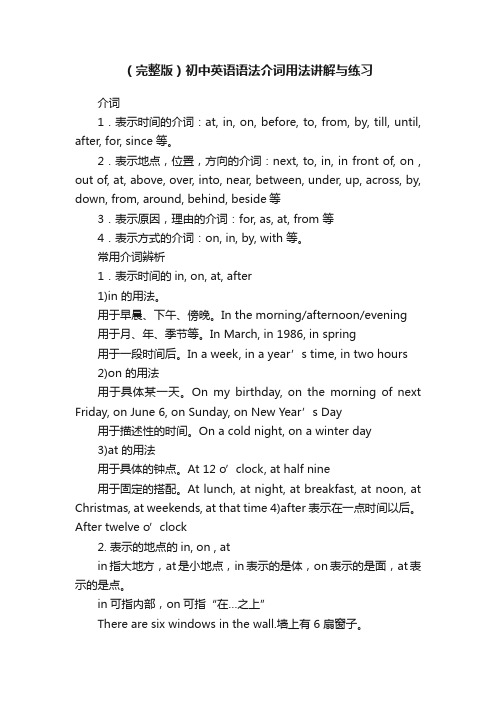
(完整版)初中英语语法介词用法讲解与练习介词1.表示时间的介词:at, in, on, before, to, from, by, till, until, after, for, since 等。
2.表示地点,位置,方向的介词:next, to, in, in front of, on , out of, at, above, over, into, near, between, under, up, across, by, down, from, around, behind, beside等3.表示原因,理由的介词:for, as, at, from 等4.表示方式的介词:on, in, by, with 等。
常用介词辨析1.表示时间的in, on, at, after1)in 的用法。
用于早晨、下午、傍晚。
In the morning/afternoon/evening用于月、年、季节等。
In March, in 1986, in spring用于一段时间后。
In a week, in a year’s time, in two hours2)on 的用法用于具体某一天。
On my birthday, on the morning of next Friday, on June 6, on Sunday, on New Year’s Day用于描述性的时间。
On a cold night, on a winter day3)at 的用法用于具体的钟点。
At 12 o’clock, at half nine用于固定的搭配。
At lunch, at night, at breakfast, at noon, at Christmas, at weekends, at that time 4)after 表示在一点时间以后。
After twelve o’clock2. 表示的地点的in, on , atin指大地方,at是小地点,in表示的是体,on表示的是面,at表示的是点。
专题07-介词-备战2023年中考英语一轮复习语法专项练(通用版)(解析版)

专题07-介词备战2023年中考英语一轮复习语法专项练(通用版)一、单项选择1.Vincent sometimes sits ________ the river and listens to music.A.on B.by C.over D.under【答案】B【详解】句意:Vincent有时坐在河边,听音乐。
考查介词辨析。
on在……上面;by在……旁边;over在……上方;under在……下面。
sit by the river表示“坐在河边”,因此空格处应用介词by。
故选B。
2.Su Yiming got his gold medal of 2022 Beijing Winter Olympics ________ the afternoon of February 15th.A.on B.in C.at D.for【答案】A【详解】句意:2月15日下午,苏翊鸣获得2022年北京冬奥会金牌。
考查介词。
on后接具体到某一天的时间或具体某一天的早晨、下午和晚上;in后跟年份、月份、季节等;at后跟具体时刻;for 用于一段时间,表示的是时间的长短,常用于完成时,和持续性动词连用。
根据“the afternoon of February 15th”可知,此处指的是具体的某一天的下午,因此用介词on。
故选A。
3.________ the first evening, we were tired after walking ________ about 4 hours. A.On; since B.In; in C.On; for D.In; for【答案】C【详解】句意:第一天晚上,我们走了大约4个小时后感到很累。
考查时间介词辨析。
on用在具体某一天早中晚前;since自……以后;in用在较长一段时间前,如世纪、年份等;for与一段时间连用,表示“(时间)长达……”。
根据“... the first evening”第一天晚上可知,第一空要用介词on,排除BD;再根据“about 4 hours”是一段时间可知,第二空要用for。
初中语法专题7介词专题
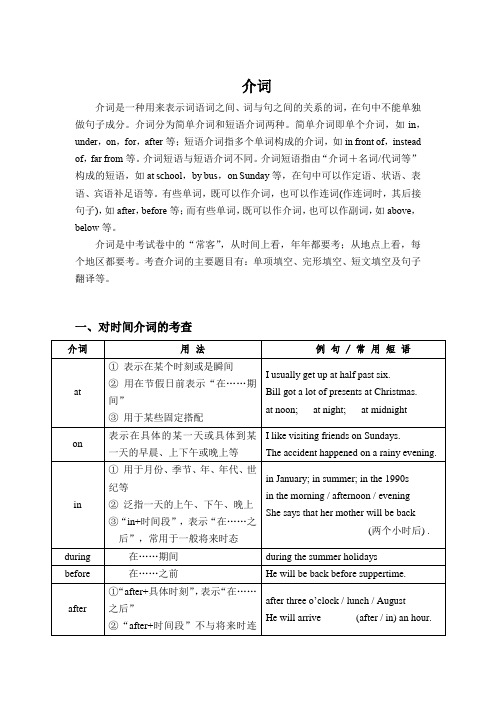
介词介词是一种用来表示词语词之间、词与句之间的关系的词,在句中不能单独做句子成分。
介词分为简单介词和短语介词两种。
简单介词即单个介词,如in,under,on,for,after等;短语介词指多个单词构成的介词,如in front of,instead of,far from等。
介词短语与短语介词不同。
介词短语指由“介词+名词/代词等”构成的短语,如at school,by bus,on Sunday等,在句中可以作定语、状语、表语、宾语补足语等。
有些单词,既可以作介词,也可以作连词(作连词时,其后接句子),如after,before等;而有些单词,既可以作介词,也可以作副词,如above,below等。
介词是中考试卷中的“常客”,从时间上看,年年都要考;从地点上看,每个地区都要考。
考查介词的主要题目有:单项填空、完形填空、短文填空及句子翻译等。
一、对时间介词的考查1. I was born ______ December 17. This year I’ll hold a birthday party for it athome.A. onB. atC. inD. by2. —Do you know Victory Day in China?—Yes, it’s ______ September 3rd ______ each year. It tells the world that Chinese peoplelove peace and hate wars. Chinese people will never forget the history.A. in; onB. on; /C. at; /D. on; in3. For many Western people, they drink cold water even ______ winter.A. onB. forC. atD. in4. —The charity walk begins ______ 9:00. Don’t be late. —No problem.A. atB. byC. inD. on5. The Dragon Boat Festival this year will come ______ four days.A. afterB. forC. duringD. in6. (短文填空)After walking around ________ some time, she came to a river.7. (首字母填空) He has been away from home s________ two days ago.8. (句子填空) The Highland Museum is opened every day ______ Monday.二、对地点、方位介词的考查at, in, on表示地点的用法:①at表地点时,指空间位置上的某一点,后面常接小地方。
中考语法专题复习介词及介词短语

中考语法复习一一介词及介词短语【考点直击】1.常用介词及其词组的主要用法及意义2.介词表示时间、方位、方式别的基本用法3.一些易混介词的辨析【语法讲解】♦介词的功能介词是一种虚词,用来表示名词或相当于名词的其它词语句中其它词的关系,不能单独使用。
介词可与名词或相当于名词的其它词构成介词短语。
介词短语可在句中作定语,状语,表语和宾语补足语。
例如:The boy over there is John’s 定语her.(The girl will be back in two hW®Our English teacher is from Aust表aD)a.(Help yourself to some fi 宾语补足语)♦介词和种类(1)简单介词,常用的有 at, in, on, about, across, before, beside, fo等o, to, without(2)复合介词,如 by means of, along with, because of, in front。
等。
instead of♦不同介词的用法(1)表时间的介词1)at, in on表示时间点用21。
例如:at six o’clock, at noon, at。
m表示在某个世纪,某年,某月,某个季节以及早晨,上午,下午,晚上时,用皿例如:in the nineteenth century, in 2002, in may, in winter, in the morning, in the等0t表n示具体的某一天和某一天的上午,下午,晚上时,用。
&例如:on Monday, on July 1st, on Sunday meaning2)since, after由since和after引导的词组都可表示从过去某一点开始的时段,但sinc前组表示的时段一直延续到说话的时刻,因而往往要与现在完成时连用。
而afte词组所表示的时段纯系过去,因而要与一般过去时连用。
07英语语法单项选择题专题训练-介词和介词短语(含答案)

专题训练07 介词和介词短语单项选择题(25*1=25)st year was the warmest year on record, with global temperature 0.68℃______the average.A.belowB.onC.atD.above2.The little pupil took his grandma ______the arm and walked her across the street.A.onB.byC.inD.at3.Starting your own business could be away to achieving financial independence.______ , it could just put you in debt.A.In other wordsB.All in allC.As a resultD.On the other hand4.______the school, the village has a clinic, which was also built with government support.A.In reply toB.In addition toC.In charge ofD.In place of5.Facing up to your problems______ running away from them is the best approach to working things out.A.more thanB.rather thanC.along withD.or rather6.The Scottish girl ______blue eyes won the first prize in the Fifth Chinese Speech Contest.A.byB.ofC.inD.with7.What we expect from you is working hard ______hardly working.A.less thanB.rather thanC.as well asD.as much as8.Mrs.Smith finds it hard to clear up the mess, as her children are always______ whenever she tries to.A.in the wayB.on watchC.in sightD.on the line9.Before you pay a visit to a place of interest, look ______a book about it in yourlocal library.A.onB.atC.forD.to10.An artist who was recently traveling on a ferry to the southern island discovered______ a long lost antique Greek vase.A.at randomB.by chanceC.in turnD.on occasion11.The doctor advised the patient to give up smoking ______his own health.A.in terms ofB.as a result ofC.in regard toD.for the sake of12.______the wet weather, they managed to arrive at the worksite before daybreak.A.In spite ofB.In case ofC.Instead ofD.In place of13.That's all for today.______where we'll get the funds,we'll talk about that later.A.In common withB.On behalf ofC.In place ofD.As to14.I went along thinking nothing ______, just looking at things around me.A.in briefB.in doubtC.in particularD.in harmony15.After the disaster, the villagers decided to build a monument ______the rescue workers who lost their lives.A.in search ofB.in place ofC.in need ofD.in memory of16.—When did you become an actor?—______1995, when I graduated from college.A.AfterB.InC.FromD.Since17.Scientists have shown that there is a connection______ cigarette smoking and certain diseases.A.withB.betweenC.toD.for18.According to the report, the number of domestic tourists visiting Shanghai has risen______5%, hitting 90 million.A.withB.byC.forD.from19.It was on a night in November that I looked with pride ______the result of my work.A.asB.forC.atD.upon20.The house has been decorated ______my taste, but I have to admit that many don't like it at all.A.withB.inC.onD.to21.Jane is in a hurry because the train to the airport leaves ______half an hour.A.byB.inC.forD.until22.September 30 is the day ______which you must pay your bill.A.byB.forC.withD.in23.It is unbelievable that Mr.Lucas leads a simple life______ his great wealth.A.withoutB.despiteC.inD.to24.Check carrots, potatoes, onions and any other vegetables______ and immediately use or throw away any which show signs of rotting.A.in demandB.in storeC.on loanD.on sale25.Tom always goes jogging in the morning and he usually does push-ups too to stay______.A.in placeB.in orderC.in shapeD.in fashion。
介词总结归纳初中

介词总结归纳初中介词是英语语法中的一个重要部分,用来表示名词、代词与其他词之间的关系。
在初中阶段,学生需要掌握并正确运用各种介词。
下面将对初中阶段常见的介词进行总结归纳。
一、表示位置或方向的介词:1. in:在某个范围、地点或建筑物内。
例:I am studying in the classroom.2. on:在某个平面或物体的表面。
例:The book is on the table.3. at:在某个特定的地点或事件上。
例:He is waiting at the bus stop.4. under:在某物的下面。
例:The cat is under the table.5. above:在某物的上面。
例:The bird is flying above the tree.6. behind:在某物的后面。
例:The car is parked behind the house.7. in front of:在某物的前面。
例:The children are playing in front of the school. 8. between:在两个物体或位置之间。
例:The river flows between the two mountains.9. among:在三个或三个以上的物体或位置之间。
例:He found his friends among the crowd.二、表示时间的介词:1. at:在特定的时间点。
例:The movie starts at 7 o'clock.2. on:在某一天、日期或节日。
例:We have a holiday on Sunday.3. in:在某个时间段或季节。
例:She was born in October.4. during:在某个时间段内。
例:I read a book during the summer vacation.5. for:表示持续时间。
初中英语语法基础——介词专题讲解 (附同步练习试题)
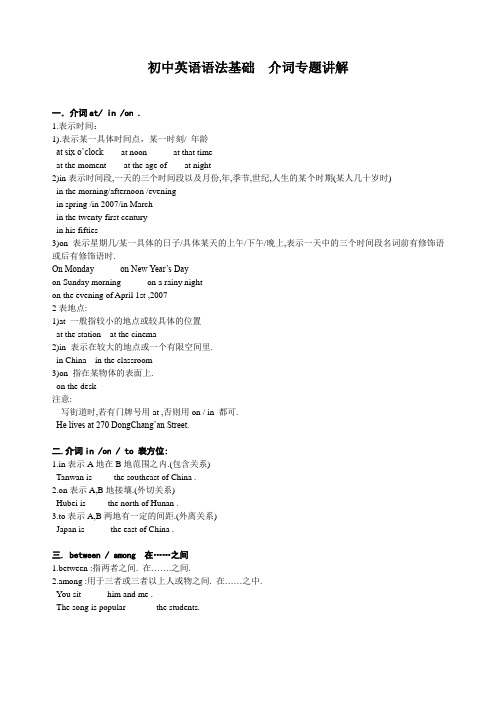
初中英语语法基础介词专题讲解一.介词at/ in /on .1.表示时间:1).表示某一具体时间点,某一时刻/ 年龄at six o’clock at noon at that timeat the moment at the age of at night2)in表示时间段,一天的三个时间段以及月份,年,季节,世纪,人生的某个时期(某人几十岁时)in the morning/afternoon /eveningin spring /in 2007/in Marchin the twenty-first centuryin his fifties3)on表示星期几/某一具体的日子/具体某天的上午/下午/晚上,表示一天中的三个时间段名词前有修饰语或后有修饰语时.On Monday on New Year’s Dayon Sunday morning on a rainy nighton the evening of April 1st ,20072表地点:1)at 一般指较小的地点或较具体的位置at the station at the cinema2)in 表示在较大的地点或一个有限空间里.in China in the classroom3)on 指在某物体的表面上.on the desk注意:写街道时,若有门牌号用at ,否则用on / in 都可.He lives at 270 DongChang’an Street.二.介词in /on / to 表方位:1.in表示A地在B地范围之内.(包含关系)Tanwan is ____ the southeast of China .2.on表示A,B地接壤.(外切关系)Hubei is ____ the north of Hunan .3.to表示A,B两地有一定的间距.(外离关系)Japan is _____ the east of China .三. between / among 在……之间1.between :指两者之间. 在…….之间.2.among :用于三者或三者以上人或物之间. 在……之中.You sit _____ him and me .The song is popular ______ the students.四.after / in 在……之后 before / in 在……之前1. after1)after + 时间段. 表示以过去某一时刻为起点的一段时间之后, 用于过去时.2)after 作介词. after doing sth.2.in +一段时间. 表示说话时或以现在为起点的将来一段时间之后.用于将来时.He came back ______ two days .He will go home___finishing his homework .He will come back _____ two days .3. before 多用于时间点或一件事之前发生,即“先于……;在……之前”He left the office bofore I got there. I’ll be back before five o’clock.4. ago 时间段+ ago 表示“多久之前”时态通常用:一般过去时I met Tom two days ago.五.with / in / by 表示“用……”1.with 表示“用…” 一般指有形的工具/ 手段/ 人体器官.He cut the apple into halves ____ a knife .注: with 表伴随, “带有,含有”He came in _____ a big smile on his face .2.in表示用某种语言,方式,途径. 或书写/绘画所用的材料. 也可表交通方式.Can you say it _____English ?He wrote a letter ____ blue ink .3.by表示乘坐交通工具, 表示方式,方法I study for a test _____ working with a group .He makes a living ____ selling newspapers .注意: 同义词组1).by phone = on the phone2).by car = in a car3).in pen = with a pen = with pens六.across / through / over / by 经过1.across 指横穿,穿过. 表示动作从某一物体表面上经过.2.through 指穿过,透过,表示从某一物体空间内通过.3.over 表示从某人或某物的上空经过或越过,不与表面接触.4.by 表示从某人/某物的旁边经过.Can you swim ______ the river ?the elephant is so big that it can’t go _____ the gate .I don’t think anyone can jump ___ the fenc e.I walked _____ the bank of China yesterday .七.in front of / in the front of1.in the front of 表示在…….内部的前面2.in front of 表示在……外面的前面There is a desk in _____ front of our classroom .There is a big tree in _____ front of our classroom.八.其它介词的用法:1.at的其它用法.1).表示“从事或正在做某事”,其后加的名词往往不加冠词.She is at work now = She is working now .2)at表示“价格或速度”The train ran at 120 kilometers an hour .2.in的其它用法:1)in表示“在……方面”词组:do well in = be good atbe weak in2)in 表示“穿着”后接表颜色的词或衣服.词组: be in +衣服= be wearing +衣服3)in作副词, “在家” = at home3.like 的用法:1).像/和……一样. 常与系动词连用.词组: look like sound like2).与what 连用, “是什么样子, 怎样”.What is he like ? He is kind .4.off的用法:1).从……下来, 脱离某物体.词组: fall off2). “休假”通常放在时间名词之后.词组: have +时间+ offHe has n’t had a night off for two hours .5.except / besides1).except 除了…….之外, 都……. . 不包括在范围之内.注: nothing but … 除了……之外,什么也没有.2).besides除了……之外,还有…… . 包括在范围之内.We all went swimming ______ Lucy .There is _______ a letter in the box .We study Japanese and French____ English .6.with / without1).with具有,含有反义词: without 没有词组: with the help of = with one’s help =because of = thanks towithout one’s help2).without 的用法:A).without + sb./ sth. 没有某人或某物B).without + doing sth . He lef t here without____(say ) “Goodbye”to usC). without sth 常与if 引导的否定的条件句.If there is no water , we can’t live .= We can’t live ______ _______ .7.on the tree /in the treeon the tree 表示“树上本身长的东西” 在树上.in the tree 表示“外界的物体进入树中” 人或物在树上.There are some apples _____ the tree .There is a boy ____ the tree.8.表示“数量的介词”about , round around , over1). about , round around表示“大约……”2).over 表示“超过”= more than.9.inside / outsideInside 在……里面------反义词:outside在….外面10.in the wall /on the wallin the wall 表示“门窗在墙上” on the wall 表示“某东西张贴或挂在墙上”九.不用介词的情况:1).当时间状语为: tonight, today, yesterday, tomorrow 等时,不用介词. What are you going to do tonight ?2).含有this, that, these, those, last, next, every/each day等时间状语.He went to Wuhan last week . I drink milk every day.3).以all 开头的时间状语前面不用介词.He has worked all day .4).以some ,any, one 等构成的时间状语前不用介词.He met a bad man one cold morning. = He met a bad man on a cold morning.介词专题小测:一、单项选择题。
初中语文-语法知识-介词的类别和用法
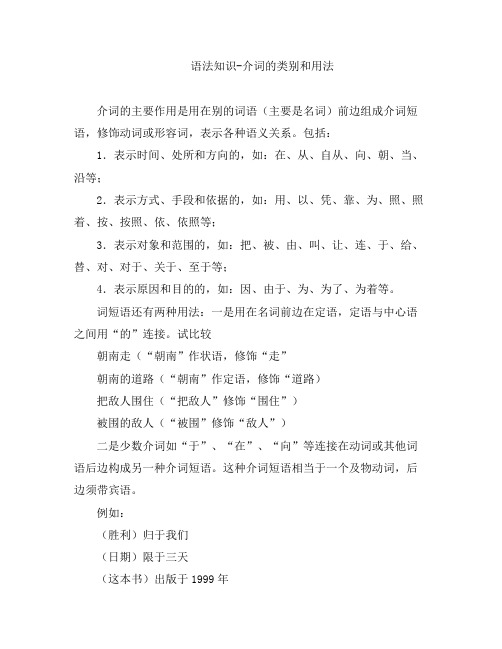
语法知识-介词的类别和用法
介词的主要作用是用在别的词语(主要是名词)前边组成介词短语,修饰动词或形容词,表示各种语义关系。
包括:
1.表示时间、处所和方向的,如:在、从、自从、向、朝、当、沿等;
2.表示方式、手段和依据的,如:用、以、凭、靠、为、照、照着、按、按照、依、依照等;
3.表示对象和范围的,如:把、被、由、叫、让、连、于、给、替、对、对于、关于、至于等;
4.表示原因和目的的,如:因、由于、为、为了、为着等。
词短语还有两种用法:一是用在名词前边在定语,定语与中心语之间用“的”连接。
试比较
朝南走(“朝南”作状语,修饰“走”
朝南的道路(“朝南”作定语,修饰“道路)
把敌人围住(“把敌人”修饰“围住”)
被围的敌人(“被围”修饰“敌人”)
二是少数介词如“于”、“在”、“向”等连接在动词或其他词语后边构成另一种介词短语。
这种介词短语相当于一个及物动词,后边须带宾语。
例如:
(胜利)归于我们
(日期)限于三天
(这本书)出版于1999年
(他)勇于攀登
(大家)走向胜利(问题)好在不多(我)习惯于早起早睡。
初一英语常见介词用法归纳

初一英语常见介词用法归纳初一学生学习英语时,介词是一个重要的语法知识点。
介词在句子中起着连接词语,修饰名词或代词的作用。
正确使用介词可以让句子更通顺、地道。
在这里,我们将归纳总结一下初一英语常见的介词用法,希望对初学者的英语学习有所帮助。
二、表示时间的介词1. At:表示具体的时间点。
- We have a meeting at 9 o'clock.- He gets up at 7:30 every morning.2. In:表示在……年、月、季节、年龄等时间段。
- We have a holiday in summer.- Her birthday is in May.3. On:表示某一天或日期。
- We have a party on Sunday.- My friend's birthday is on December 3rd.4. During:表示在……期间。
- I watch TV during the weekend.- She reads books during the summer vacation.5. For:表示持续的时间。
- I have been learning English for 3 years.- They will stay in Beijing for 2 weeks.四、表示目的的介词1. For:表示为了……。
- I bought a present for my mother.- He is studying hard for the final exam.2. To:表示去某个地方的方向,也表示给某人或某物。
- I go to school by bike.- She gives a gift to her friend.。
初中英语语法专题介词与常见短语

初中英语语法专题介词与常见短语介词(preposition 简写prep.),又称作前置词,表示名词、代词等与句中其它词的关系,在句中不能单独作句子成分。
我在这里整理了相关资料,快来学习学习吧!初中英语语法专题介词一、概念介词(preposition)表示与名词、代词等其它词的关系,不能单独做句子成分,介词后面的成分称为宾语。
二、分类介词可以用来表示时间、地点、方位、方式、手段等。
①重点词整理解析(at\in\on\by\before\after\until\for\since)at1. at+点钟at one oclock 在七点钟2. at+the+n s (shop) at the bakers (shop) 在面包店at the hairdressers (shop)在理发店3. at noon/night/midnight 在正午/夜晚/午夜4. at home/work/school/church 在家/上班/上学/做礼拜5. at breakfast/lunch/dinner 在吃早/午/晚饭6. arrive at+小地点arrive at the airport 到机场7. at+节日at Spring Festival 在春节期间8. call sb at+号码打...号码找某人9. email sb at+邮件地址发...电子邮件给某人10. call at +地点探望某个地方11. 其它固定搭配at the price/speed...of 以...的价格、速度in1. in+年、月in 20xx/May 在20xx年五月2. in+季节in Summer 在夏天3. in the morning/afternoon/evening 在早上/下午/晚上4. in+世纪in the twenty-first century 在21世纪5. in+颜色表示穿着the girl in red 穿红色衣服的女孩6. in+语言in English/Chinese 用英语/汉语7. in+声音in a weak voice 用微弱的声音8. in+时间段表示将来in five minutes 五分钟以后(划线提问用how soon)9. in+地点(大地点) in Qingdao 在青岛10. in+物体在...里面in the glass 在杯子里11. in+方向in the west 在西边12. 其它in front of 在...前面in the end 最终in the past few years 在过去的几年里on1. on+详细日期/礼拜on May 8th 在五月八日on Wednesday 在周三2. on+ 节日(带Day 的节日) on Mothers Day 母亲节3. on+地点on the table(在桌子上) on the train(在火车上)4. call on+sb call on your friend 探望你的挚友5. 表示方位(毗邻、接壤) Russia is on the north of China. 俄罗斯与中国北部相连。
- 1、下载文档前请自行甄别文档内容的完整性,平台不提供额外的编辑、内容补充、找答案等附加服务。
- 2、"仅部分预览"的文档,不可在线预览部分如存在完整性等问题,可反馈申请退款(可完整预览的文档不适用该条件!)。
- 3、如文档侵犯您的权益,请联系客服反馈,我们会尽快为您处理(人工客服工作时间:9:00-18:30)。
介词介词是一种用来表示词语词之间、词与句之间的关系的词,在句中不能单独做句子成分。
介词分为简单介词和短语介词两种。
简单介词即单个介词,如in,under,on,for,after等;短语介词指多个单词构成的介词,如in front of,instead of,far from等。
介词短语与短语介词不同。
介词短语指由“介词+名词/代词等”构成的短语,如at school,by bus,on Sunday等,在句中可以作定语、状语、表语、宾语补足语等。
有些单词,既可以作介词,也可以作连词(作连词时,其后接句子),如after,before等;而有些单词,既可以作介词,也可以作副词,如above,below等。
介词是中考试卷中的“常客”,从时间上看,年年都要考;从地点上看,每个地区都要考。
考查介词的主要题目有:单项填空、完形填空、短文填空及句子翻译等。
一、对时间介词的考查【例题】1. I was born ______ December 17. This year I’ll hold a birthday party for it athome.A. onB. atC. inD. by2. —Do you know Victory Day in China?—Yes, it’s ______ September 3rd ______each year. It tells the world that Chinese peoplelove peace and hate wars. Chinese people will never forget the history.A. in; onB. on; /C. at; /D.on; in3. For many Western people, they drink cold water even ______ winter.A. onB. forC. atD. in4. —The charity walk begins ______ 9:00. Don’t be late.—No problem.A. atB. byC. inD. on5. The Dragon Boat Festival this year will come ______ four days.A. afterB. forC. duringD. in6. (短文填空)After walking around ________ some time, she came toa river.7. (首字母填空) He has been away from home s________ two days ago.8. (句子填空) The Highland Museum is opened every day ______ Monday.二、对地点、方位介词的考查at, in, on表示地点的用法:①at表地点时,指空间位置上的某一点,后面常接小地方。
如:at the bus stop;②in表地点时,指在某一立体空间范围内,后面接大地方。
如:in shanghai;③on表地点时,指某物与另一物表面相接触,或与某地方接壤等。
如:on the table等。
in, on, to表示方位的用法:①范围之内用in;②相邻、接壤用on;③不相邻或隔海相望用to。
【例题】9. —I like the weather in Kunming. It’s warm all year long.—Yes. And the temperature stays ______ zero all the time.A. atB. belowC. aroundD. above10. In cold winter, the temperature in Harbin often remains ______ zero all day.A. aboveB. belowC. overD. under11. The bank is ______ the bookstore and the post office.A. at the front of D. among C. between D. in12. You must be careful when you swim ______ the lake.A. acrossB. belowC. overD. through13. —Excuse me, where is the bookstore?—Go ______ the bridge. You’ll see it on your left.A. onB. crossC. acrossD.through14. Heilongjiang Province is _____ the northeast of China.A. toB. inC. onD. at15. Cambridge is a small city ______ the east of England.A. betweenB. withC. inD. under16. Jim sits behind me, so I sit ______ him.A. at the top ofB. at the end ofC. in the middle ofD. in front of三、对手段、方法介词的考查【例题】17. Ma Yun, the Chairperson of Alibaba Group, has made much money _____the Internet.A. throughB. alongC. acrossD.towards18. More and more people in Shanghai choose to go to work ______ underground.A. inB. withC. byD. for19. Gina, what’s this ______ English?A. byB. forC. inD. with20. We can save money ______ cooking our own meals instead of eating outside.A. byB. toC. forD. with四、对其他常用介词的考查【例题】21. —Do you remember what she looked like when you first met her?—Of course. She was tall and thin ______ long hair.A. inB. withC. onD. for22. Jack had to stop working though it was ______ his own wishes.A. onB. forC. againstD. by23. Wild animals are our friends. We shouldn’t kill them ______ food or clothing.A. inB. withC. aboutD. for24. It is great ______ us to get so many favourite books onI n t e r n a t i o n a lChildren’s Book Day.A. toB. withC. ofD. for25. He looked at me and, ______ a word, smiled.A. inB. withC. withoutD. for26. All of us went to the park ______ Bob. He had to look after his sister.A. besidesB. withC. exceptD.besides五、对介词短语的考查【例题】27. My mother says my friend is similar ______ me, but I think shei s d i f f e r e n t______ me.A. as; fromB. to; fromC. to; toD. as; to28. This photo reminded the old man ______ the days when he was young.A. withB. forC. byD. of29. They hope it can protect them ______ terrible air.A. inB. fromC. forD. at30. When the king saw that she as playing his old harp, he was filled ______ joy.A. inB. ofC. byD. with31. This kind of dress is ______ this year, and I really want to get oneA. in dangerB. in troubleC. in styleD. intime32. Mr. Yang’s daughter is pretty good ___ drawing pictures and won many prizes.A. withB. forC. inD. at33. Shen Xue and Zhao Hongbo won the gold medal for China sow e’r e p r o u d ______ them.A. inB. onC. ofD. for34. I learn ______ my teacher and my classmates at the corner.A. toB. atC. forD. from35. Compared ______ some unhappy people, those who are always p l e a s e d a n d relaxed are less likely to suffer colds.A. atB. withC. inD. of 附:介词的省略三、即时训练1. This food is free. You don’t have to ______ it.A. look forB. pay forC. ask forD. wait for2. You see, Kevin is writing ______ his left hand.A. atB. asC. forD. with3. ______ age 7, Bruce won second prize in the piano competition.A. InB. AtC. OnD. For4. We can be thankful every day, not just ______ Thanksgiving Day.A. inB. onC. toD. by5. This school is different ______ others. It has many out-of-classactivities.A. offB. fromC. ofD. for6. Jessica took part in the English competition ___ the morning of April tenth.A. inB. onC. toD. by7. Don’t play computer games too much. It’s bad ______ your eyes.A. forB. withC. onD.at8. Sam likes skating very much. He has been skating ____ four hours.A. forB. sinceC. withD.in9. —When is Henry’s birthday party, Lynn?—The 18th, ______ about three o’clock in the afternoon.A. inB. atC. onD. to10. Remember to run ______ the road quickly while it is clear.A. acrossB. forC. afterD.of11. —Excuse me. Where is the Hope Cinema?—Go up this road to the end. Go ______ the bridge and you’ll find it.A. crossB. crossingC. acrossD.down12. Zhang Mei really wants to improve her English. She oftenpractises English ______ chatting with her English friend Tony.A. inB. byC. forD.with13. —What are Mexicans supposed to do when they meet ___ thefirst time?—They are supposed to shake hands.A. forB. onC. amongD.in14. Don’t worry ______ your physics. I will help you ______ it.A. with; aboutB. about; onC. on; aboutD. about; with15. They had a picnic ______ the foot of the mountain last Sunday.A. forB. toC. ofD. at参考答案:1-5. ABDAD 6. for 7. since 8. except9-10. DB 11-15. CACBC 16-20. DACCA 21-25. BCDDC 26-30. CBDBD 31-35. CDCDB即时训练1-5. BDBBB 6-10. BAABA 11-15. CBADD。
